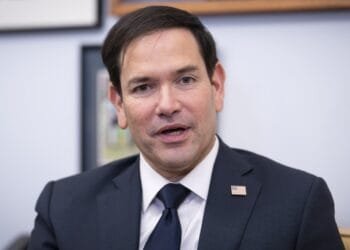Tariq Butt, Correspondent / AP
Traders in Pakistan went on strike on Wednesday, shutting down their businesses in all major cities and urban areas to protest a rise in electricity costs and new taxes imposed on shop owners.
The opposition parties including Jamiat Ulema-e-Islam-Fazl, Jamaat-e-Islami (JI), and the Awami National Party — have declared their support for the agitating traders.
Shutters in various parts of the country — including the major cities of Karachi and Lahore — remained closed as the call for strike from traders’ associations received an overwhelming response from the community.
The government of Prime Minister Shahbaz Sharif has steadily raised electricity prices since Pakistan last month struck a deal with the International Monetary Fund (IMF) for a new $7 billion loan. The higher cost of living and price hikes have triggered widespread discontent and drawn protests.
Most of the public markets across Pakistan were closed on Wednesday, though pharmacies and grocery stores selling basic food items remained open. Kashif Chaudhry, a strike leader, said those were not closed so as not to inconvenience the general public.
The strike was called by JI chief Naeem-ur-Rehman and endorsed by most of the various traders’ unions and associations.
The strike is aimed at forcing the government to reverse the recent hikes in power bills and the controversial tax that followed the recent talks with the IMF, which wants to see Pakistan broaden its tax base.
The Pakistan Oil Tankers’ Association had said it “fully supported” the call for a strike by the trader’s community and the JI. The oil tankers’ body asserted the strike was the “voice of the country’s poor, helpless and destitute public against the heavy taxes and atrocious electricity bills.”
The Karachi chapter of the Tehrik-e-Labbaik Pakistan (TLP) also endorsed the call for a strike, its chief Mufti Qasim Fakhri said in a statement. Criticising the government for “enjoying privileges amid sky-high inflation,” Fakhri termed the imposition of taxes a “part of a foreign conspiracy.”
JI Karachi chief Monem Zafar called the Tajir Dost Scheme (trader-friendly scheme) a “tajir dushman scheme” (traders’ enemy scheme).
Speaking to the media in Karachi, Zafar said: “You (government) burdened the salaried class with taxes and you burdened traders with taxes under the ‘tajir dushman scheme’.”
Slamming the government for being “enemies” of the common citizens through imposing harsh tax policies, the JI leader said, “Whether it is the Zardari family or the Sharif family, we do not accept these policies.”
In Lahore, shops on Hall Road, where the JI has set up a camp to mobilise traders and the general public, as well as on Mall Road, remained closed as traders observed the strike.
The strike extended to Multan, Faisalabad, Islamabad, Rawalpindi, and other cities of Punjab as well. Merchants on the Chakwal-Talagang road and in the main market of Kharian city kept their shops closed.
Meanwhile, traders in Islamabad’s I-10 sector also reportedly heeded the call for the strike.
In Khyber Pakhtunkhwa (KP), traders and transporters across the Malakand and Hazara divisions observed a shutter-down and wheel-jam strike against the heavy taxes. Rallies in various cities of the province were also carried out with the support of the JI.











